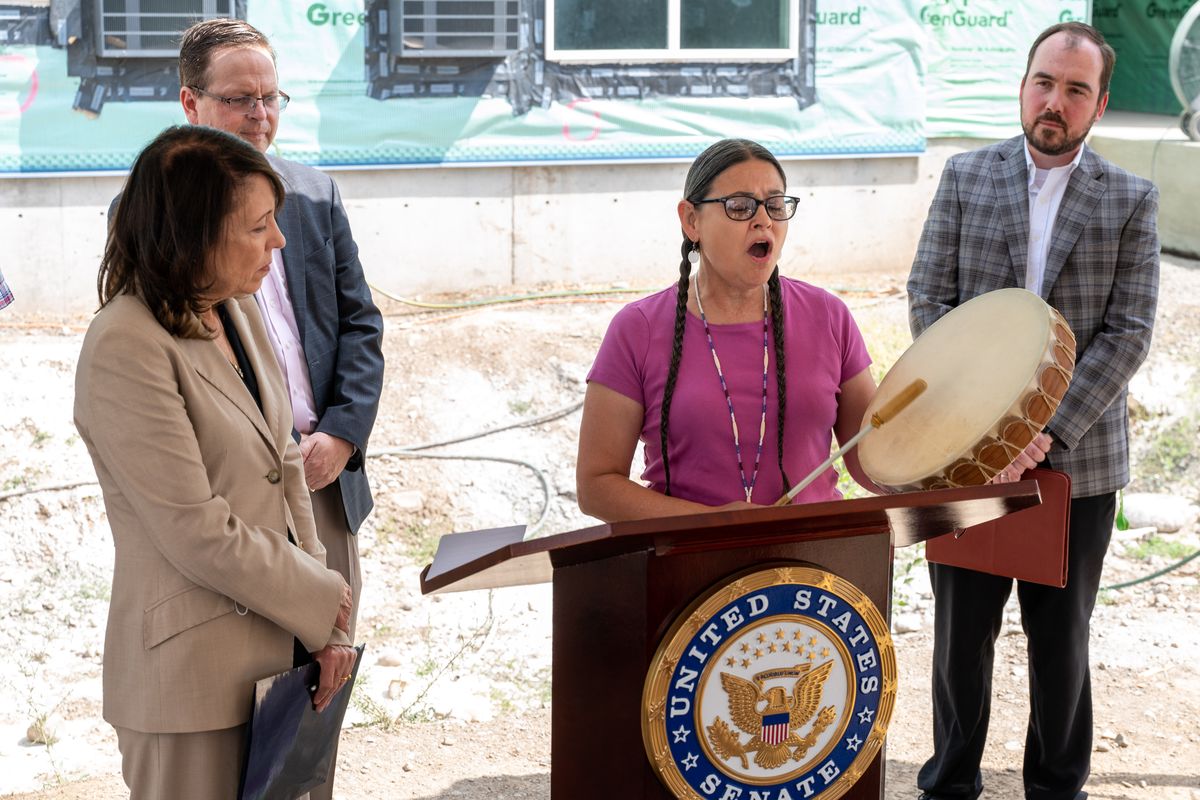‘We need more affordable housing’: Cantwell pushing for housing money in infrastructure bill
Senator Maria Cantwell speaks about the need for federal action to combat the affordable housing crisis in Spokane, Thursday, July 1, 2021. The press event and site tour took place at Gonzaga Family Haven, a 73-unit affordable family housing complex under construction on North Nevada Street. (COLIN MULVANY/THE SPOKESMAN-REVIEW)Buy a print of this photo
There’s a bustling construction site in the Logan Neighborhood near Gonzaga Prep on North Nevada Street.
Big trucks kick up dust from the bare ground. Piles of 2-by-4s lie at the base of plywood-covered buildings. Men in hard hats walk about, working to finish this 73-unit, $22 million affordable housing project by fall.
Standing out of the sun under a white tent rigged with mist machines, U.S. Sen. Maria Cantwell said on site Thursday that Spokane, Washington and America need to see thousands more housing projects like the five-building Gonzaga Family Haven.
Cantwell is pushing to include affordable housing money in a federal infrastructure bill.
“Affordable housing should be part of the critical infrastructure discussion,” Cantwell said. “We’re here today to say we need more affordable housing in America.”
It may be difficult for progressive Democrats to get housing included in an infrastructure package.
On March 31, President Joe Biden unveiled the American Jobs Plan – a $2.65-trillion infrastructure proposal. That wide-ranging, eight-year plan included money for everything from highways, railroads and airports, to affordable housing, clean water and broadband internet.
Last week, the Biden Administration agreed to a bipartisan compromise that cut the proposal to $1.2 trillion.
The bipartisan deal completely eliminated the $326-billion portion of Biden’s original plan that dealt with affordable housing, buildings and schools.
Because of that, Cantwell is attempting to rally support to get housing back into the package. It’s possible that the final package will be passed without Republican votes, in which case Cantwell and other like-minded politicians will need to convince more moderate Democrats to include affordable housing dollars.
Spokane, Washington and many parts of the U.S. are experiencing a dire housing shortage coupled with skyrocketing prices.
In Spokane, buyers snatch up homes within days after they hit the market. Rentals, especially ones below $1,000 a month, are scarce. Housing costs are rising far faster than earnings and homelessness is on the rise.
Government-subsidized affordable housing is needed to solve the crisis, Cantwell said, and the best way to subsidize affordable housing is with affordable housing tax credits. Increase the availability of tax incentives and new construction will follow, she said.
Specifically, Cantwell is asking for a 50% increase in Low Income Housing Tax Credits – and she’s been calling for the increase for years.
Low Income Housing Tax Credits, in essence, give investors tax breaks for funding low-income housing projects. Since the mid-1990s, the credits have helped subsidize the creation of roughly 110,000 affordable housing units annually. Cantwell said roughly 90% of all affordable housing projects – including the Gonzaga Family Haven – use the credits.
In the Evergreen State, the Washington State Housing Finance Commission decides which developers get the tax credits – the developers then sell those credits to investors in exchange for funding.
Steve Walker, executive director of the Housing Finance Commission, said affordable housing projects often can’t proceed without the help of the tax credits.
But Walker’s agency is only able to award credits to about half of the projects it receives. If there were more credits available, there would be more affordable housing construction, Walker said, and that construction is desperately needed.
“It means revitalizing neighborhoods,” Walker said. “It means jobs.”
Cantwell estimates that if the infrastructure bill includes money for a 50% increase in Low Income Housing Tax Credits, developers will build 6,000 affordable housing units in Spokane in the next decade. Washington would see 66,000 additional units and the country as a whole would see 2 million units.
Spokane City Council President Breean Beggs said affordable housing is essential for a thriving community.
“We all belong,” Beggs said, “and you can’t belong if you don’t have a bedroom.”
Reporter Orion Donovan-Smith contributed to this story.

